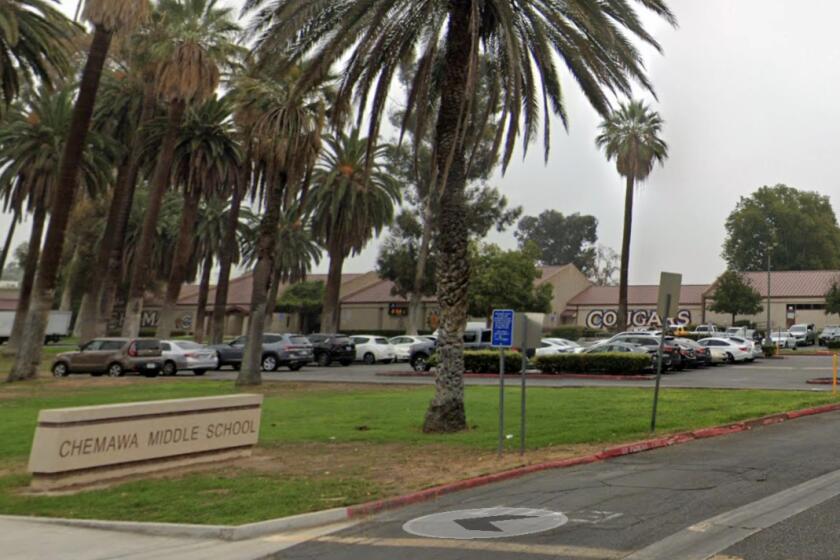Vote foretells difficulties for school reform
After listening to the debate at last week’s Los Angeles school board meeting, business leader Carol Schatz said she was appalled.
She had attended to support a resolution to speed the firing of teachers accused of serious crimes. But even this proposal -- tiptoeing on the margins of improving teacher quality -- generated heated objections from the teachers union and its supporters.
With some last-minute amendments and sniping among board members, the resolution passed by a single vote.
“I came away depressed,” said Schatz, who heads the 500-member Central City Assn. of Los Angeles. “If they can barely pass something like that, how are they going to tackle teacher quality?”
By even grazing the hot-button topic, the nation’s second largest district has entered one of the most contentious debates in American education, one that increasingly is pitting powerful teachers unions against school boards and would-be reformers.
Teacher effectiveness is considered one of the most significant factors in student success. But giving it a hard look can involve reexamining teacher tenure, teacher evaluations, dismissal of “bad” teachers and merit pay for “good” ones -- all highly charged political issues, especially in California.
Such scrutiny historically has been urged by those on the right, but Democrats -- including President Obama and Arne Duncan, his education secretary -- have recently embraced it.
“If a teacher is given a chance or two chances or three chances but still does not improve, there is no excuse for that person to continue teaching,” Obama said in a March speech.
The issue came up again this month in a study by the New York-based education reform group the New Teacher Project, which described a “national failure” to measure teacher success.
In California, a Times investigation recently found, it is remarkably time-consuming and cumbersome for school districts to fire teachers who don’t meet standards. A review of cases in which teachers statewide contested their firings showed that far more teachers were fired for egregious acts than for poor teaching.
In L.A., the debate is only beginning. The Los Angeles Unified School District has set up a task force, headed by education reformer and former Occidental College President Ted Mitchell, to make recommendations on improving teacher quality.
The panel, whose other members are to be chosen by Supt. Ramon C. Cortines, is not limited to looking at teachers accused of egregious or immoral acts. It may delve into what is good and bad teaching, who should be the judge and how the system should promote the good and purge the bad.
Complaining that he had been left out of the process thus far, A.J. Duffy, president of United Teachers Los Angeles, proposed unsuccessfully to delay the vote on the resolution on teacher firing. He was noncommittal about whether he would support the task force.
“If I’m comfortable with the composition of the task force, then I’ll agree to be a part of it,” Duffy said. “Otherwise, that issue is going nowhere.”
Yolie Flores Aguilar, the member of the school board who proposed the task force, conceded that it could be difficult to surmount opposition.
“This is the sacred cow of all sacred cows,” she said.
Just discussing the firing of teachers accused of crimes prompted sharp debate at L.A. Unified’s board meeting Tuesday.
The measure, which passed 4-3, was a considerably whittled-down version of a proposal by school board member Marlene Canter to urge the state to speed the termination of poorly performing and abusive teachers.
Confronting strong opposition from fellow board members and the teachers union, Canter focused exclusively on teachers deemed to have committed immoral acts, such as physical or sexual abuse.
“This isn’t about teacher evaluation!” she said repeatedly during Tuesday’s hearing.
At the insistence of union members, the measure was amended to include administrators as well.
Still, the resolution was rejected by the union and some board members.
“This is a political mishmash under the guise of helping children,” said Marguerite Poindexter LaMotte, before casting her vote in opposition. She was joined by colleagues Julie Korenstein and Richard Vladovic.
Duffy questioned the motives of Schatz and other business leaders. “They want to break the power of the union,” he said.
But school board member Tamar Galatzan said the resolution should have been a “slam dunk.”
“I think they [union officials] see it as a slippery slope toward revamping rules on tenure and seniority,” Galatzan said.
California lawmakers appear willing to wade into the debate but say that for any reform to be successful, it has to have the backing of teachers unions.
“There is tremendous political pressure in Sacramento,” said state Sen. Gloria Romero (D-Los Angeles), chairwoman of the Senate Education Committee, referring to the power of teachers unions and others. “But with President Obama calling for a restructuring of public education, we have a window of opportunity to . . . run with it as fast as we can.”
Teachers unions, including UTLA, say they are not opposed to reforms but want to help shape them, given their collective experience in the classroom. Student test scores, they say, cannot be used as the sole indicator of teacher quality.
California is building separate databases for student test scores and teacher information, but the law prohibits using either database for teacher evaluation.
The policy recently drew strong rebukes from Duncan, the education secretary and former head of Chicago public schools.
“It’s like suggesting we judge a sports team without looking at the box score,” Duncan said of California’s policy at a speech to the Institute for Educational Science last week. “I think that’s simply ridiculous.”
--
jason.felch@latimes.com
More to Read
Sign up for Essential California
The most important California stories and recommendations in your inbox every morning.
You may occasionally receive promotional content from the Los Angeles Times.











